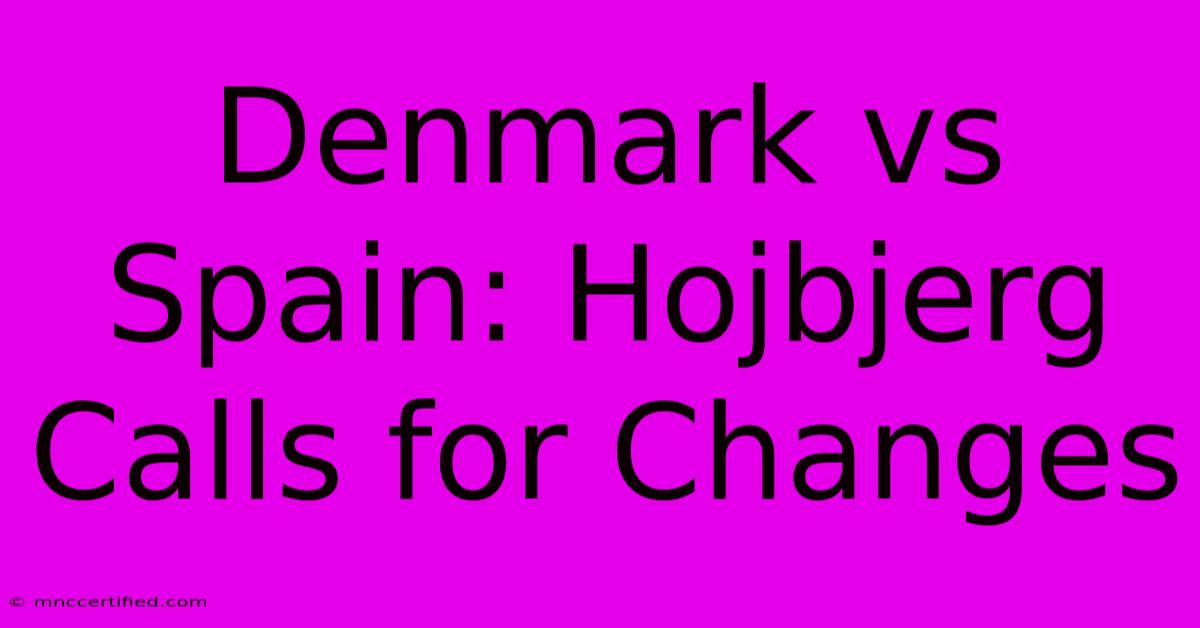Denmark Vs Spain: Hojbjerg Calls For Changes

Table of Contents
Denmark vs Spain: Hojbjerg Calls for Changes
Denmark's midfield maestro, Pierre-Emile Højbjerg, has issued a rallying cry for change following their recent UEFA Nations League clash against Spain. The match, which saw Spain emerge victorious, highlighted areas where the Danish team needs improvement if they are to compete at the highest level. Højbjerg's comments, delivered with characteristic passion and insight, have sparked debate among fans and pundits alike. This article delves into the specifics of Højbjerg's call for change, analyzing the Denmark vs Spain game and exploring the potential implications for the Danish national team moving forward.
A Disappointing Defeat: Analyzing the Denmark vs Spain Match
The Denmark vs Spain game, while closely fought in patches, ultimately ended in a defeat for the Danes. While the final score might not tell the whole story, several key aspects of the match revealed areas needing attention. Spain's superior ball possession and their clinical finishing proved decisive. Denmark, while showing moments of brilliance, struggled to maintain consistent pressure and capitalize on their opportunities. This inconsistency, according to Højbjerg, is the crucial area requiring immediate rectification.
Key Tactical Shortcomings:
- Midfield Domination: Spain's control of the midfield was a significant factor in their victory. Denmark struggled to win back possession effectively, allowing Spain to dictate the tempo and create numerous scoring chances. Højbjerg himself admitted the team's midfield performance fell short of expectations.
- Defensive Vulnerability: While Denmark's defense showed resilience at times, lapses in concentration led to crucial goals conceded. This vulnerability highlights the need for improved defensive organization and communication.
- Lack of Clinical Finishing: Denmark created several opportunities, but their failure to convert them proved costly. Improving finishing accuracy is another key area for improvement highlighted by the game.
Højbjerg's Call for Change: A Deeper Dive
Højbjerg's post-match comments weren't simply criticisms; they were a call to action. He emphasized the need for a fundamental shift in the team's approach. He didn't single out individual players but instead highlighted collective responsibility and the need for improved tactical flexibility.
Specific Areas Højbjerg Addressed:
- Increased Intensity: Højbjerg stressed the importance of bringing a higher level of intensity to the game, both offensively and defensively. He argued that Denmark needs to be more aggressive in winning back possession and disrupting Spain's rhythm.
- Improved Teamwork and Communication: The captain emphasized the need for better communication and coordination between players, particularly in midfield and defense. He stressed that a stronger collective unit is crucial to overcome stronger opponents.
- Tactical Adjustments: Højbjerg suggested the need for greater tactical flexibility, adapting their game plan based on the opposition's strengths and weaknesses. He hinted at a need for more proactive pressing and a willingness to take more risks.
The Road Ahead: Implications for Denmark
Højbjerg's words carry significant weight. As a key player and a respected leader, his call for change resonates deeply within the Danish team. The coming months will be crucial in determining whether the team can successfully implement the necessary improvements.
Potential Changes:
- Tactical Revamp: The coaching staff may need to reassess their tactical approach, possibly incorporating new strategies to improve midfield dominance and defensive solidity.
- Squad Rotation: The coach might explore different player combinations to find the optimal balance and synergy within the team.
- Increased Training Intensity: Training sessions may need to focus on improving fitness levels, tactical awareness, and finishing accuracy.
The Denmark vs Spain game served as a valuable lesson for the Danish national team. Højbjerg's candid assessment and call for change provide a clear roadmap for future improvement. The coming months will be pivotal in determining whether Denmark can heed his call and rise to the challenges ahead. Their success will depend on their ability to address the identified weaknesses and build a more cohesive and effective team. Only time will tell if they can successfully navigate this crucial period of transition.

Thank you for visiting our website wich cover about Denmark Vs Spain: Hojbjerg Calls For Changes. We hope the information provided has been useful to you. Feel free to contact us if you have any questions or need further assistance. See you next time and dont miss to bookmark.
Featured Posts
-
Scotlands Clarke Selection Headache
Nov 19, 2024
-
Brightway Insurance Boca Raton Fl
Nov 19, 2024
-
Occidental Home Insurance Reviews
Nov 19, 2024
-
General Liability Insurance Idaho
Nov 19, 2024
-
Uk School Closings Check For Updates Now
Nov 19, 2024